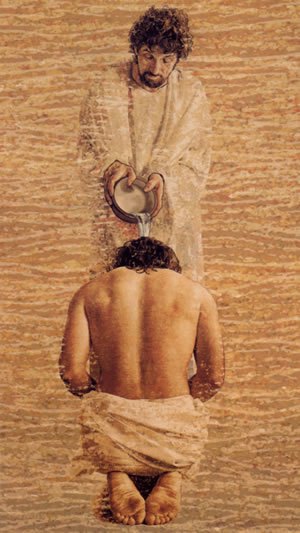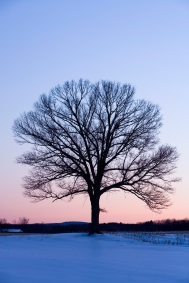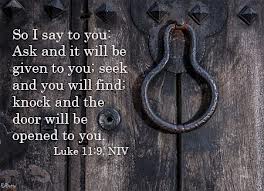
[The following is the sermon given at St. John’s Episcopal Church, Northampton, MA. Epiphany I, Year A]
The Baptism of the Lord is recounted in all four gospels. Only in Matthew’s gospel do we have a dialogue between Jesus and John. John doesn’t want to baptize Jesus because he understands who Jesus really is. The early Church Fathers had a terrible time with this event because:
1) Jesus didn’t need to be cleansed of any sins and
2) wasn’t Jesus greater than John?[1]
But this baptism had a greater purpose. Jesus encouraged John saying, Let it be so, now; for it is proper for us in this way to fulfill all righteousness. To be righteous was to be in right relationship with God, with self, others. What was about to happen in the Jordan was going to be a revelation of relationship – a moment of clarity for Jesus and for us.
We might keep in mind that Jesus had been “off the radar” since he was 12. From the time his parents found him talking with the rabbis in the temple to the day he stood before John at the river’s edge, we have the “lost years.” Scholars can never reclaim that part of Jesus’ life, but most believe he waited for a window of opportunity – a sign from God that his work should begin. Something triggered his entry into public ministry. From the evidence given in the gospels, scholars agree that John’s mission was that “sign.” When the time was just right, John – that wonderful Elijah-esque desert madman – emerged from the wilderness to offer a new kind of baptism. [Baptism, itself, was nothing new. It was for Gentiles who wanted to become Jewish. They had to immerse themselves and be cleansed of the sin of the world before they could join God’s chosen people.]
John preached baptism to the Jews. He asserted their complicity in the sin of the world and proclaimed that the Messiah was near. Only by turning from sin could one be ready to recognize his coming. Many resented John and the truth he proclaimed. But many more listened. It became, in the words of William Barclay, “a unique national movement of repentance and of search for God.”[2] Among those moved by the message was the family of Jesus.
When Jesus chose to be baptized by John, he said, “yes” to all that was to come. He who was without sin chose from the beginning of his ministry to stand with sinners – to be in solidarity with the people he came to save.[3]
When Jesus rose from the water, what was implicit in his life of prayer became explicit. The Father’s voice was heard – not just in his heart. And the Spirit who played with the Word over the waters of creation, came to rest on the flesh he took to share our life. This “cameo appearance” of the Holy Trinity reveals to us the place of Jesus, the Word made flesh, in the life of God. Beloved Son, God’s anointed one through whom the Spirit will come into the heart of every believer. In his baptism we are given a glimpse into the life of God – three persons in a communion of love.
I don’t remember my baptism. [I was two weeks old and it was November 22, 1963 – the day Jack Ruby shot Lee Harvey Oswald. So, nobody else really remembers my baptism either.] I find myself a bit jealous of people who can remember their own baptism – children, teens or adults who chose Christ in freedom – who came to the water because they were ready to live like the Trinity – in a communion of love.
Regardless of when it happens, our baptism is effective. When we come to the water, as Jesus did, the Church voices what we know to be true in our hearts – that we are a “beloved” child. The Spirit anoints us with power – not the power to reign over others but the power that enables the giving of ourselves. In baptism we, too, say “yes” to all that will come. The sacrament opens some door to the workings of grace – invites the Risen Lord into our lives and empowers us to be his love in the world. It is the most transformative moment in the life of every Christian. It makes crystal clear that we belong to Christ and to each other. Like the Triune God, we have been made to exist in a communion of love. When we rise from the water we are no longer alone in this world.[4] Though we continue to exist within the boundaries of our skin and bone, we are deeply connected to one another and to all who have walked the journey of faith. That connection is real. We feel it in prayer and we feel it here when we gather around this table.
Prayer is a funny thing. Sometimes, we tell ourselves that deep, rich, contemplative prayer is the work of priests, nuns and monks – it’s their job to pray, isn’t it? Maybe it’s the word we get hung up on. Prayer is simply our communication with God – the two-way street of mutual love between the creature and the Creator. It looks and feels different for every one and there is no “wrong” way to do it. As we wake up to God’s presence in our lives we find ourselves praying more and more and we don’t even know we’re doing it. That is part of the grace of our baptism kicking in – leading us forward into the heart of God. We are all contemplatives living into our skin as “beloved” child. When we pray the implicit connection we feel all the time becomes explicit. We embrace the longing we feel for home and we sense the presence of so many who have walked this way before us.
The Sunday Eucharist is the greatest prayer of the Christian community. Baptism gives us a specifically Christian identity. The Eucharist is the action we do together as faithful Christians. We move from the water to the table where we give thanks for Jesus – for his example of self-giving love on the cross. We give thanks for the gift of eternity – for unending life in God through his name. And we leave this assembly nourished with his body and blood to continue his mission. Empowered by water and the Spirit and strengthened by Word and wheat, we go forth – like little Baptists – proclaiming that there is love and mercy, compassion, joy and peace to found here in God’s family. We proclaim it with our lives out there so that others may find their way home.
It is a truth too wonderful to keep to ourselves.
[1] Barbara E, Reid, OP “The Gospel According to Matthew,” New Collegeville Bible Commentary (Collegeville, MN: Liturgical Press, 2009.) 16.
[2] William Barclay, “The Gospel of Matthew, Volume 1” The New Daily Study Bible (Louisville, KY: Westminster John Knox Press, 2001.) 69.
[3] Barclay, 69.
[4] Catherine Mowry LaCugna, God For Us: The Trinity & Christian Life (New York, NY: Harper Collins Publishers, 1991.) 263. “Baptism…transforms solitariness and separateness into communion.”






